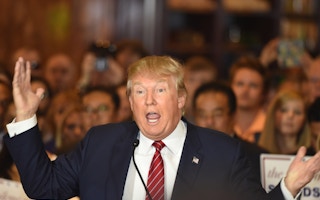The forces fighting global warming and battling to strengthen environmental protection must brace for heavy collateral damage as a result of Donald Trump’s victory in the United States’ presidential election. Judging by Trump’s campaign rhetoric, and by statements from his Republican allies, environmental protection in the US will be gutted in a frenzy of deregulation and inducements for domestic oil, coal, and gas producers.
To continue reading, subscribe to Eco‑Business.
There's something for everyone. We offer a range of subscription plans.
- Access our stories and receive our Insights Weekly newsletter with the free EB Member plan.
- Unlock unlimited access to our content and archive with EB Circle.
- Publish your content with EB Premium.
Environmentalists are assessing the potential damage and developing strategies to avoid an onslaught driven by the most extreme anti-sustainability forces that have ever controlled Capitol Hill.
The list of possible victims is long and depressing. If worse comes to worst, America will become much less green, while dealing a crippling blow to international cooperation.
At the recent climate conference meeting (COP 22) in Marrakesh, attention focused on the various ways a Trump administration might kill the climate agreement reached at COP 21 in Paris last year.
Death could come by assassination, with Trump tearing up the agreement. Or it could come by starvation, with the US refusing to do or pay its share. Or it could be tortured to death, with the US asking everyone else to do more.
Surely, there are more options, but we are not compelled to contemplate them. We don’t need to – and we shouldn’t. Very little is known about what the Trump administration will actually do. Some hope reason will prevail at least to some extent, particularly given that markets are now pushing the green transition. Others fear it will not.
But the simple fact is that we don’t know what Trump will do, because he doesn’t know, either. His administration’s environmental policy is not carved in stone; it’s written in water, which always seeks the fastest route to the lowest point.
How deep the zealots and the coal lobby will be able to make that point depends partly on the barriers built by the rest of us.
That means concentrating on mobilizing the forces that can strengthen the case for America to remain part of the global move toward environmental sustainability. This will not convince diehards in the new administration, but it may sustain more moderate forces.
So, who is this “we” that must now take action?
First, “we” are US state governments and legislatures, nongovernmental organizations, local communities, and corporations. All need to galvanize Americans’ support for protecting local environments and contributing to global solutions.
Second, “we” are the international community: the almost 200 members of the United Nations that in 2015 adopted the Sustainable Development Goals and the Paris climate agreement. It is critically important that all UN members, whether big or small, insist that these global agreements still direct the world’s actions, regardless of what Trump does.
It must be abundantly clear to the incoming administration that the combined economic and environmental interest in pursuing the sustainability agenda will continue to push countries and companies alike in that direction.
It is helpful that China has already said that it will not forego the opportunities inherent in the green transition, and that it will take the global lead if the US bows out.
And China will not be alone. While many will regret the absence of American leadership, or even steps in the opposite direction by the Trump administration, the US is no longer strong enough to make all the difference. Other countries will fill the gap and gain the benefits, and they should make that known loud and clear.
Trump’s America can depart the train, which may well happen, but it cannot stop it. The rest of the world will continue to move ahead.
Corporate America and capital markets ought to reinforce that message, not as a political statement, but as a warning that a US economy that sacrifices the opportunities implied by the sustainability agenda will be less attractive to investors – and thus less prosperous.
Last month, 365 major US companies and investors did just that, issuing a public appeal to Trump not to abandon the Paris climate agreement. If Trump is to deliver more jobs and higher incomes to his voters, one vehicle to do so is to promote the green agenda of energy efficiency and renewables.
“
Trump’s America can depart the train, which may well happen, but it cannot stop it. The rest of the world will continue to move ahead.
The fourth component of the “we” who must act are engaged consumers worldwide. Marching in the streets shouting slogans at elected leaders will not make the difference. Acting to organize consumers locally, nationally, regionally, and globally might.
The message needs to be sent not only by individual consumers, but also by organizations with the capacity to encourage and amplify the message: “We will not buy products and services defying the sustainability agenda, and we will give preference to quality products and brands that respect and promote sustainability.”
Whatever form it takes, the message should be direct and transparent, and it should also target US corporations taking advantage of any relaxation of domestic environmental and emission standards.
Most of us did not vote for Trump, and we are not obliged to follow his lead. It’s the other way around: the more strongly we organize to stay the course and reinforce action to halt global warming and promote sustainability, the more likely it will be that pragmatic members of the new majority can minimize the damage at home and abroad.
Bo Lidegaard, former editor-in-chief of the Danish daily Politiken, is the author, most recently, of Countrymen.
Copyright: Project Syndicate, 2016.
www.project-syndicate.org











